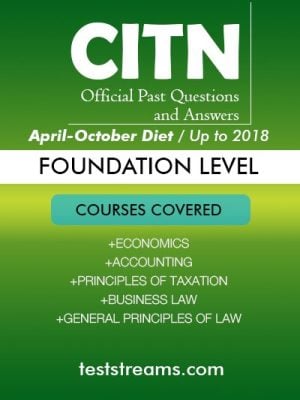
Thousands of qualified candidates fail aptitude tests every year. This is not because they are unprepared but because they repeat simple avoidable mistakes.
Aptitude tests play a major role in shortlisting for major recruitment processes such as NIS, NNPC, and CBN.
The difference between passing and missing out often comes down to preparation strategy, not intelligence.
This guide explains the five biggest mistakes candidates make during aptitude tests. And how to avoid them using clear and effective preparation methods that work.
Mistake 1: Ignoring the Test Format
Many candidates study blindly without knowing the exact format of the exam. This single mistake wastes effort and leads to confusion on test day.
When you do not understand what to expect, you spend valuable time figuring things out instead of answering questions confidently.
How to fix it:
- Study past questions from reliable sources like Teststreams: They show you real patterns and help you understand what each section demands.
- Learn the test sections: Focus on verbal reasoning, quantitative reasoning, logical reasoning, and general knowledge so nothing takes you by surprise.
- Practice under timed conditions: Simulate the real test structure to build confidence, improve accuracy, and strengthen time control.
Mistake 2: Poor Time Management

Many candidates lose marks because they spend too much time on a single question and don’t get to the rest.
Aptitude tests are all about being quick and accurate, not perfect on every question.
If you don’t manage your time well, you’ll leave many easy questions unanswered.
Here’s how to fix it:
- Use the 60-second rule per question: Don’t let one question trap you. If a question is taking longer than a minute, move on. Every question carries the same mark, so it’s smarter to answer more questions correctly than to waste time on one. You can always come back later if you have extra time.
- Skip and return to tougher questions: Some questions are designed to slow you down. When you find one that looks tricky, skip it and move to the next. Finishing the easy ones first builds confidence and helps you secure more points. Once you’ve answered all the simple ones, then go back to the tougher ones with whatever time you have left.
- Train with timed practice tests to build rhythm: Practicing under real test conditions helps you get used to the pressure. Set a timer when practicing so you can learn how fast one minute feels. Over time, you’ll develop a natural rhythm. You’ll know when to move on and when to guess. That habit will make a huge difference on test day.
Mistake 3: Guessing Without Strategy
Many candidates guess answers without thinking and end up losing marks.
Random guessing may seem like a shortcut. But it often hurts your score, especially when there’s negative marking.
Here’s the solution:
Eliminate obvious wrong options first: Before you guess, look for choices that clearly don’t make sense. Removing even one or two wrong answers gives you a better chance of picking the right one. Don’t rush. Doing a quick check can make a big difference.
Make educated guesses only after narrowing choices: If you can’t find the correct answer, make a smart guess. Use clues from the question to choose between the remaining options. A guess based on logic is always better than a wild one.
Review similar question patterns in Teststreams materials: Practice helps you spot patterns in how questions are asked. The more you study similar examples, the easier it becomes to spot traps and make smart guesses during real tests.
Mistake 4: Neglecting Basic Concepts
Many candidates jump straight to hard questions and forget the basics.
This is a big mistake because most aptitude tests rely on simple math, grammar, and logic.
If your foundation is weak, even easy questions will feel hard.
Here’s how to fix it:
Revisit secondary-school level topics: Go back and study simple topics like fractions, ratios, tenses, and logical connectors. These are the building blocks of most test questions. A strong grasp of basics helps you solve harder ones faster.
Practice with structured drills: Set aside time each day to practice one topic at a time. For example, spend 15 minutes just on ratios or verb tenses. Focused drills help your brain remember patterns and reduce careless mistakes.
Review error-based feedback after each mock test: After every practice test, go through your wrong answers and find out why you missed them. Write down your weak spots and work on them. Learning from your own mistakes is the fastest way to improve.
Mistake 5: Last-Minute Cramming

Many people wait until a few days before the test to start reading.
That is too late. Aptitude tests need steady practice, not rush reading.
You can’t build speed and accuracy in one night.
How to fix it:
Create a 2-week study plan: Start early and plan your study days. Divide the topics into small parts and study a little every day for two weeks. Small and steady steps help you remember more than trying to learn everything at once.
Mix study with timed practice: Don’t only read notes. Practice with a timer after studying each topic. This trains your brain to think fast and stay calm during the real test.
Use Teststreams PDFs to spot question patterns: Go through past questions in Teststreams materials. You will notice that some topics appear again and again. The more you study those patterns, the better you get at answering them.
Bonus Tip: Overlooking Mental Readiness
Even if you study hard, test anxiety can mess up your performance. When your mind is tired or nervous, you forget what you already know. Staying calm and ready is just as important as studying.
Practice under real test conditions: Try doing your practice tests the same way the real exam will be. Same time limit, same quiet setting. This helps your brain get used to the pressure so you stay relaxed during the real test.
Sleep well and arrive early to stay mentally sharp: Go to bed early the night before your test. Wake up on time and get to the test venue early. A calm and rested mind always performs better than a tired and rushed one.
To Wrap It Up
Avoiding these mistakes can be the difference between getting rejected and getting shortlisted.
When you manage your time, stay calm, and practice smart, your chances of success rise fast.
Get Past Questions and Answers in Any Industry
Get the verified past questions and timed practice kits on Teststreams to prepare smarter, boost confidence, and outperform other candidates in your next aptitude test.









